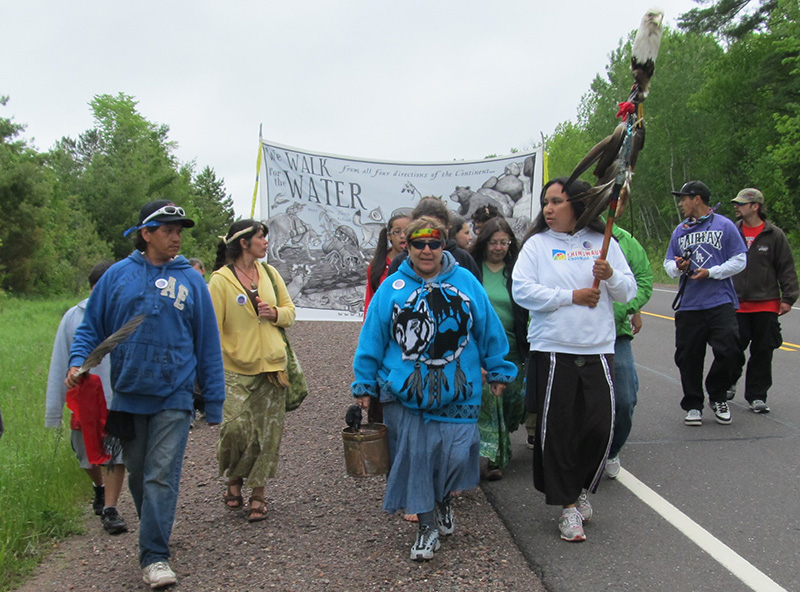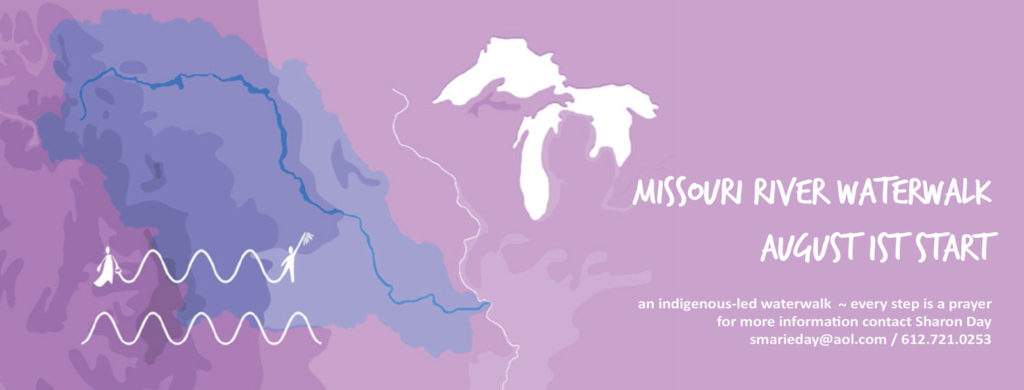

Roxanne Ornelas "water walks" to protect and promote our waterways
Follow the pail on the Nibi Walk
The Nibi Walk Water Walkers will carry a copper pail filled with the headwaters of the Missouri River. This symbolic act can be followed through a GPS tracking system.
Follow the path of the pail online at http://www.nibiwalk.org/spot/.
By Carole Johnson, university news and communications
Roxanne Ornelas of geography is a water walker.
On Tuesday, Aug 1, the associate professor will join other Native American water walkers as they begin the Nibi Walk, a 2,341-mile-long spiritual journey down the Missouri River to raise awareness of issues threatening the nation's waterways.
“It’s personal,” said Ornelas of her upcoming trip, the fifth of its kind for the self-described protector of water. Born on the Pacific and raised around water, Ornelas has dedicated her personal and academic life to preserving the earth’s water and natural resources.
“Our bodies contain mostly water,” she said. “People forget this. We have to remind ourselves of this personal relationship to water.”
Ornelas collaborates with indigenous M’dewin spiritual leaders of Minnesota’s Ojibwe nation, and others, whose charge is to protect and educate about water. M’dewin follow the spiritual path of the Anishinaabe people to protect water. In most indigenous nations around the world, women are responsible for the care and protection of water. M’dewins commit their lives to this charge.
 Ornelas continues her commitment to raise awareness and to protect our nation’s longest river with this summer’s walk, beginning at the headwaters of the Missouri River in Three Forks, Montana. About 30 miles are covered each day with walkers taking turns in a relay race, leap frog formation.
Ornelas continues her commitment to raise awareness and to protect our nation’s longest river with this summer’s walk, beginning at the headwaters of the Missouri River in Three Forks, Montana. About 30 miles are covered each day with walkers taking turns in a relay race, leap frog formation.
“We say each step is a prayer for the water,” she said.
A special copper pail filled with water from the Missouri will be carried along the route by water walkers who say, “Ngah izitchigay nibi ohnjay” when water bodies are passed along the way – Anishinaabe language for “I will do it for the water.”
The journey is demanding. The days begin at 3 a.m. and while the walking ends at sunset, the day is not done. Evenings are spent with the host communities discussing the dangers facing the nation’s waters: climate change, fracking, pollution.

Roxanne Ornelas
As a researcher, Ornelas plans to collect stories along the way to share with students in the classroom.
“I encourage students to look at earth and our resources in a holistic kind of relationship … to think more about sustainable practices rather than just the extraction of resources,” she said.
McConnell Lecture Series looks at the geographies of Indigenous peoples
In February 2018, Miami University’s department of geography welcomes Daniel Wildcat, author of Red Alert!: Saving the Planet with Indigenous Knowledge, as the keynote for the annual McConnell Lecture. The lecture is part of a yearlong series of talks on the geographies of indigenous peoples. Other lectures will take place at 3 p.m. on Sept. 22, Oct. 20, Nov. 10, and March 30 in Shideler Hall.
Wildcat gives us another way to look at protecting the environment, said Ornelas, whose own studies look at connecting the traditional ecological knowledge of the Indigenous people with the expertise of government policy makers.
This year marks the tenth anniversary of her Indigenous Women’s Leadership Project, which works to encourage indigenous women to aspire to environmental management and leadership roles.
Ornelas will return to Miami in late August to teach, but will rejoin the walk at the end of September for the closing ceremonies in St. Louis, where the Missouri joins the Mississippi River.
“We have a belief,” she said. “We walk each day with a vision to the seventh generation who will come after us: that we live in a way that protects the environment for those who will come seven generations from today.”
Ornelas also holds affiliate faculty status in Miami’s Institute for the Environment and Sustainability.
Follow @MiamiOHNews and Carole Johnson @CLJtweets on Twitter.
